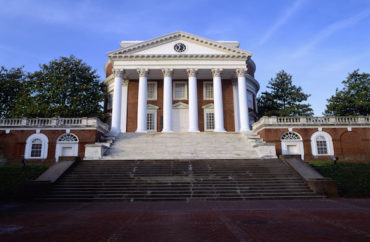
‘We don’t have the manpower or the money to do everything at once’
The University of Virginia’s Board of Visitors unanimously approved President James Ryan’s strategic plan to make UVA the best public school in the country by 2030.
Now that the August plan has taken off, the administration has to figure out which initiatives to prioritize — such as increasing diversity — and how to fund them.
“A Great and Good University” outlines four overarching initiatives: “strengthen [the university’s] foundation,” “cultivate the most vibrant community in higher education,” “enable discoveries that enrich and improve lives,” and “make UVA Synonymous with Service.”
Among its approximately 40 goals are plans to diversify faculty, expand opportunities for low-income and first-generation students, and build a new performing arts center. Ryan’s plan will also require all sophomores to live in campus housing, which The Cavalier Daily editorial board warned could increase the cost of living for students.
MORE: University to spend $121 million on diversity in just two years
One of the most expensive objectives listed in the 18-page proposal is UVA’s plan to launch a new School of Data Science. The State Council of Higher Education for Virginia last month officially approved the creation of the school, which is funded by a $120 million grant.
Considering that grant is the largest private donation in university history, it can only hope that other donors will consider offering philanthropic support for the plan’s financially ambitious goals.
Aside from private donations, the rest of the plan’s initiatives will be funded by the university’s Strategic Investment Fund, debt services, and university and state funds.
When the plan debuted, Rector James Murray acknowledged the financial challenge. “We don’t have the manpower or the money to do everything at once, so the President is going to have to prioritize,” he said, according to The Cavalier Daily.
The plan’s timeline is still under works. While some initiatives — such as a minimum wage increase — will be implemented next year, other strategic goals are set to be completed by 2030.
$4 million for minimum-wage bump – and more for contract employees
The plan’s sweeping aim to create a “just and sustainable community” encompasses several community-related challenges, including housing, the minimum wage, educational opportunity, the city’s transportation system, and access to health care.
“What ends up happening within the local community does have a ripple effect to the students. Even though in many ways I think students can be insulated from the outside world, they’re not totally disconnected from it,” Derrick Wang, a senior and the student member for the Board of Visitors, told The College Fix in a phone call.
The administration will increase its minimum wage to $15 per hour for all full-time employees who are eligible for benefits beginning January 1 of next year, a project that will cost the university about $4 million per year. The university is currently negotiating to increase the minimum wage of contract employees, whose wages it doesn’t directly control.
University spokesperson Wes Hester elaborated on the university’s plans to improve the transportation system in the city.
MORE: Columbia to spend an additional $100 million on diversity efforts
“The University is a member of the Regional Transit Partnership and works closely with City, County, JAUNT, and other transportation providers to improve transit service in the area,” Hester said in an email. “We are also looking at improving biking options, specifically as party of our joint work on the Emmet-Ivy Corridor and the City’s Smartscale project on Emmet Street.”
Wang emphasized the importance of community outreach: “The role of the university is not just as an educator of students.” For taxpayer-funded institutions, “there is a responsibility for the university to not just be solely internally focused.”
The university has a “moral responsibility … to make sure that they are promoting the good of not just the students and faculty that work there,” Wang said, “but also the employees who live in the region and the broader community at large.”
‘We are not anticipating more significant increases’ than specified
Asked about a potential tuition increase to fund the plan, Wang was skeptical that forcing students to shoulder the cost would accord with the plan’s goals.
“Obviously I don’t know for sure exactly how everything is going to shake out,” he said, speaking only for himself. “If the idea is for UVA to be an affordable and accessible institution that provides an excellent education at a good value, then obviously the way to do that is not to increase tuition a ton.”
The university is downplaying the possibility of any such jarring tuition increase.
“The University is projecting in its Six Year Plan that future increases will be roughly inflation plus 1 percent and we are not anticipating more significant increases to support the strategic plan,” Hester wrote in an email.
In-state tuition this year for the College of Arts & Sciences is just under $13,700, while out-of-state tuition is more than $46,300.
MORE: Baylor launches 22 new diversity efforts in span of one year
Wang isn’t worried about the pragmatics of implementing particular proposals.
“I think they’re all doable,” he told The Fix. “Obviously the plan is fairly broad and it’s not something that lays out a specific blueprint for exactly how these things are going to be accomplished.”
Regarding the prioritization, he said, “At least on the student side, I think value, access, affordability — those are all really crucial issues.” He emphasized that the university will continue to make scholarships and grant aid more available to low-income and first-generation students.
The Cavalier Daily reported that President Ryan and J.J. Davis, chief operating and financial officer, will prioritize this fall, “once there are estimates about how much the initiatives will cost and which resources will be available to complete these goals. ”
EDITOR’S NOTE: The author is a member of The Cavalier Daily editorial board.
MORE: UVA trains faculty, staff on how to ‘stop graduating racists’
MORE: UVA won’t explain how it won award for increasing diversity
IMAGE: Joseph Sohm / Shuttersock.com
Like The College Fix on Facebook / Follow us on Twitter






Please join the conversation about our stories on Facebook, Twitter, Instagram, Reddit, MeWe, Rumble, Gab, Minds and Gettr.